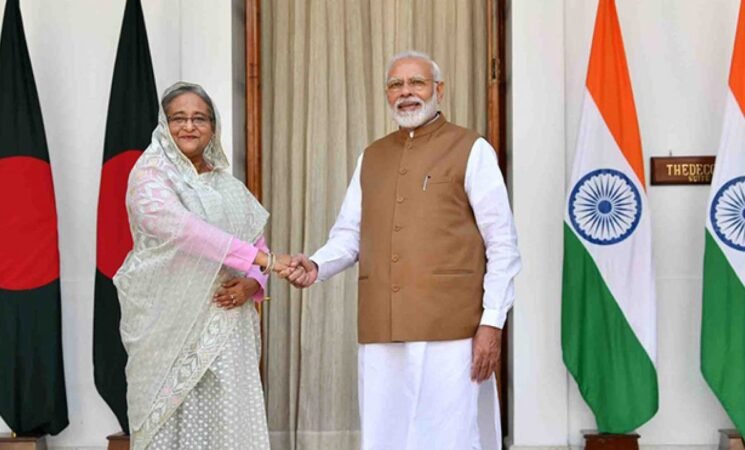25 May 2020, NIICE Commentary 4848
Dr. Mohammad Tarikul Islam & Md Zaki Faisal
The bilateral relations between Bangladesh and India are imperative having a strong historic basis. Based on mutual benefit and mutual respect, both countries are making every effort towards moving forward. The geographical proximity, cultural affinity and shared history of both the countries, remain as strong base for streamlining the relationship. It all began in December 1971, when India became the first country to recognize Bangladesh as a separate and independent state and established diplomatic relations immediately after its independence.
Bangladesh-India Track II Diplomacy
It has been 48 years of bilateral relations and firm pledge from both sides particularly Modi and Hasina Government that have conceded the further momentum towards a close and friendly relationship shared between India and Bangladesh. Indian Prime Minister, Narendra Modi's invitation to the SAARC leaders at his swearing ceremony in 2014 was an unprecedented move that reflected his vision of South Asia. He is aware of the fact that if India is to build up as a regional power, a friendly neighborhood shall definitely play a crucial role in it. His reaching out to the neighbors before engaging with great powers such as the US, Russia, China and the EU, is a clear indication of priority that Modi attaches to the region. Over the last five years, the two countries signed a number of treaties that encouraged trade and economic cooperation, provided easier connectivity resulting in more people-to-people contact, and most importantly, addressed a number of security issues that had strained their relationship in the past.
In addition to it, Bangladesh-India relations have been blessed with the informal nature of diplomacy, known as Track II diplomacy. Thus, the momentum of greater regional integration was re-energized in recent years but, meeting all the challenges require more than business as usual. With the application of Track II diplomacy across level, greater cooperation and regional economic integration can bring about gains in these areas and help tap into the proximity and demographic dividend, South Asian countries enjoy.
According to the High Commission of India in Bangladesh, every year Indian government offers 200 scholarships for Bangladeshi students under ICCR (Indian Council for Cultural Relations) Scholarship Scheme. Over 3,000 ICCR scholarships have been granted to Bangladeshi nationals by the government of India till 2018. Besides, these two countries agreed to establish High Level India- Bangladesh Education Dialogue, strengthen collaboration on technical and vocational education and provide mutual support in scientific issues and in the areas of Information and Communication Technology (ICT).
Similarly, both the countries have deeper ‘Economic Diplomacy’. Trade statistics between India and Bangladesh published by High Commission of India in Bangladesh shows that Bangladesh has emerged as major trading partner of India with bilateral trade exceeding USD 10 billion annually. Bilateral trade between Bangladesh and India was USD 9.5 billion in FY2017-18 with exports to India pegged at USD 0.87 billion and imports, at USD 8.6 billion. Bangladesh's exports to India crossed USD 1.0 billion mark in 2019.
Bangladesh directly and indirectly contributes to the health and medical tourism in India. In 2015-16 fiscal year, statistics published by Directorate-General of Commercial Intelligence (DGCI) of India showed that every one in three foreign patients in India were from Bangladesh. According to the DGCI, among 460000 inbound patients, 165000 patients were from Bangladesh and the trend continues. Bangladeshi patients contributed 50 percent of the total revenue from medical tourism which is 35 percent of the contribution of foreign patients. A report published by the government of Bangladesh declaring that, Bangladesh is the largest, in terms of foreigner using Indian medical facility in 2015-16 fiscal year. Since, a large number of Bangladeshi patients are receiving Indian medical facilities, Indian government has extended the visa facility for Bangladeshi patients. For the growing trend of Bangladeshi contribution in the Indian healthcare sector as well as other sectors, both the countries has eased the routes for travel. New bus service as well as new rout of railway has been introduced. Rail link between Khulna and Kolkata were inaugurated during the visit of Prime Minister Sheikh Hasina in India.
It is believed that cross-cultural programmes not only enrich the cultural dimension but also promote cross cultural co-operation among the countries. Cultural exchange plays a key role in enhancing the bilateral relations as culture is a notable medium that fosters better understanding and appreciation in different levels. The Indira Gandhi Cultural Centre, New Delhi, India regularly organizes divergent cultural programs featuring both - Indian and Bangladeshi artists. With regard to sports, cricket diplomacy between Bangladesh and India is not new. All-rounder Shakib Al Hasan, who plays for Indian Premier League, has been among the most impressive Bangladeshi players.
India and Bangladesh’s geographical locations complement each other and present an opportunity for both to further develop their connectivity links and economies. The relationship is strengthening because of the high-level economic exchanges, visits, meetings and the wide-ranging people-to-people interaction. There may be various misunderstandings between India and Bangladesh, but the interaction among people portrays the feeling of fraternity amongst them. It also helps in the development of non-fundamental thoughts via which both nations can be inspired for socio-economic development. The youth is desirous to work hand-in-hand and in new areas of cooperation, despite having differences in security and migration concerns. The bilateral cooperation is based on a win-win formula for both the countries. It is felt that peace and security in the region, is essential for economic growth and development, and is undoubtedly our shared responsibility. Given the recurrent challenges posed through the wave of globalization, if governments are not actively interacting with each other, the productivity is reduced. Similarly, there should be exchanges as different levels between the two countries.

